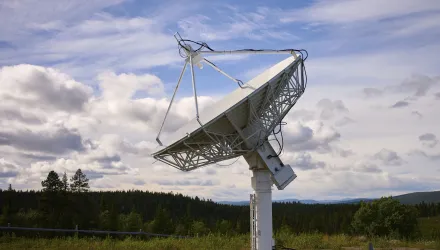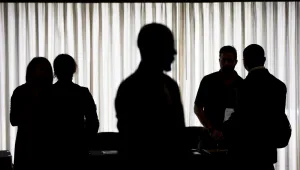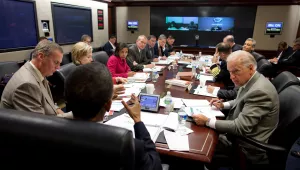Nicholas Dujmovic, Ph.D., is an assistant professor of politics and the director of the Intelligence Studies Program at The Catholic University of America. Before teaching at Catholic University, he served in the United States Coast Guard for 14 years and as an intelligence officer and staff historian with the Central Intelligence Agency for 26 years. Dr. Dujmovic received his Ph.D. in 1996 from the Fletcher School of Law and Diplomacy at Tufts University.
Michael Warner, Ph.D., serves as the Command Historian at U.S. Cyber Command. Formerly, he was a historian for the Central Intelligence Agency and the Historian for the Office of the Director of National Intelligence. He earned his Ph.D. in history from the University of Chicago and has taught at American University, Columbia University, and Johns Hopkins University. His book, The Rise and Fall of Intelligence: An International Security History, was published in 2014.
Sara Castro, Ph.D., is an assistant professor of history at the U.S. Air Force Academy and a Wilson China Fellow at the Wilson Center. She has formerly served as a teaching assistant professor at the University of North Carolina, Chapel Hill and as an intelligence analyst for the federal government. Dr. Castro earned her doctorate in history from the University of North Carolina, Chapel Hill and a master’s degree from the Fletcher School of Law and Diplomacy at Tufts University.
John Sipher is the co-founder of SpyCraft Entertainment, a global production company that provides talent and content related to intelligence, and a nonresident senior fellow at the Atlantic Council’s Eurasia Center. In 2014, John retired from a 28-year career at the Central Intelligence Agency’s National Clandestine Service. At the time of his retirement, he was a member of the CIA’s Senior Intelligence Service. He holds a master’s degree in international affairs from Columbia University.
Alex Finley is a former officer of the Central Intelligence Agency’s Directorate of Operations, where she served in West Africa and Europe. Before joining the CIA, Alex worked as a journalist, covering Capitol Hill, the Pentagon, and the Department of Energy. Her writing has appeared in Slate, Reductress, Funny or Die, and other publications. She is the author of Victor in the Rubble and Victor in the Jungle, two satirical novels about intelligence and political affairs.
The Honorable Susan M. Gordon was Principal Deputy Director of National Intelligence until August 2019 and holds almost three decades of intelligence experience with the Central Intelligence Agency. As PDDNI, she managed the Office of the Director of National Intelligence and focused on advancing intelligence integration across the Intelligence Community. Previously, she was Deputy Director of the National Geospatial-Intelligence Agency, where she drove NGA’s transformation to meet the challenges of modern intelligence agencies.
Rolf Mowatt-Larssen is a Senior Fellow at the Belfer Center and served as the Director of the Center’s Intelligence Project until July 2019. Previously, he was the Director of Intelligence and Counterintelligence at the U.S. Department of Energy and spent 23 years as a CIA intelligence officer in various domestic and international posts. Prior to his career in intelligence, Rolf served as an officer in the U.S. Army and is a graduate of the United States Military Academy, West Point, NY.
Nicholas Reynolds, Ph.D., is an author and historian. After receiving his Ph.D. from Oxford University, he served as an infantry officer and official historian at the Marine Corps. For many years, he worked at the Central Intelligence Agency as a historian for the CIA Museum. Nicholas is the author of Writer, Sailor, Soldier, Spy: Ernest Hemingway’s Secret Adventures, 1935 – 1961 and has most recently written Need to Know: World War II and the Rise of American Intelligence.
Nathalia Holt, Ph.D., is the New York Times bestselling non-fiction author of Rise of the Rocket Girls, The Queens of Animation, and Cured. She has written for numerous publications including The New York Times, The Los Angeles Times, The Atlantic, Slate, Popular Science, PBS and Time. She is a former fellow at the Ragon Institute of MGH, MIT and Harvard University. Her latest book, Wise Gals: The Spies Who Built the CIA and Changed the Future of Espionage, is expected for publication in September 2022.
Michael Morell is the former Deputy Director of the Central Intelligence Agency. He also served as the agency’s Acting Director twice, once in 2011 and again from 2012 to 2013. Michael is considered one of the nation’s leading national security professionals with extensive experience in intelligence and foreign policy and has been at the center of the United States’ War on Terror. He is the author of 2015 New York Times bestseller The Great War of Our Time: An Insider’s Account of the CIA’s Fight Against Terrorism – From al Qaida to ISIS.
Graham Allison, Ph.D., is the Douglas Dillon Professor of Government at Harvard University. Allison was the “Founding Dean” of Harvard’s John F. Kennedy School of Government, and until 2017, served as Director of its Belfer Center for Science and International Affairs. As Assistant Secretary of Defense in the first Clinton Administration, Dr. Allison received the Defense Department’s highest civilian award, the Defense Medal for Distinguished Public Service, for his role in reshaping relations with former Soviet states.



